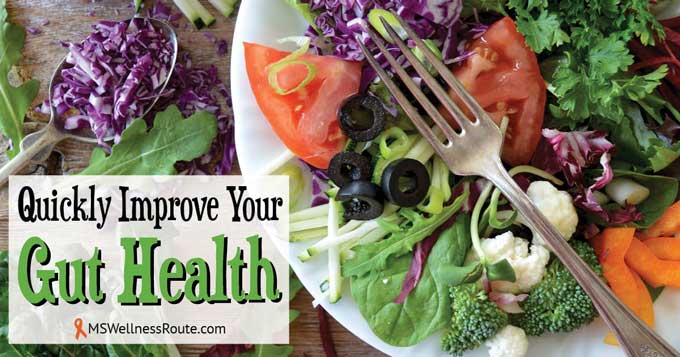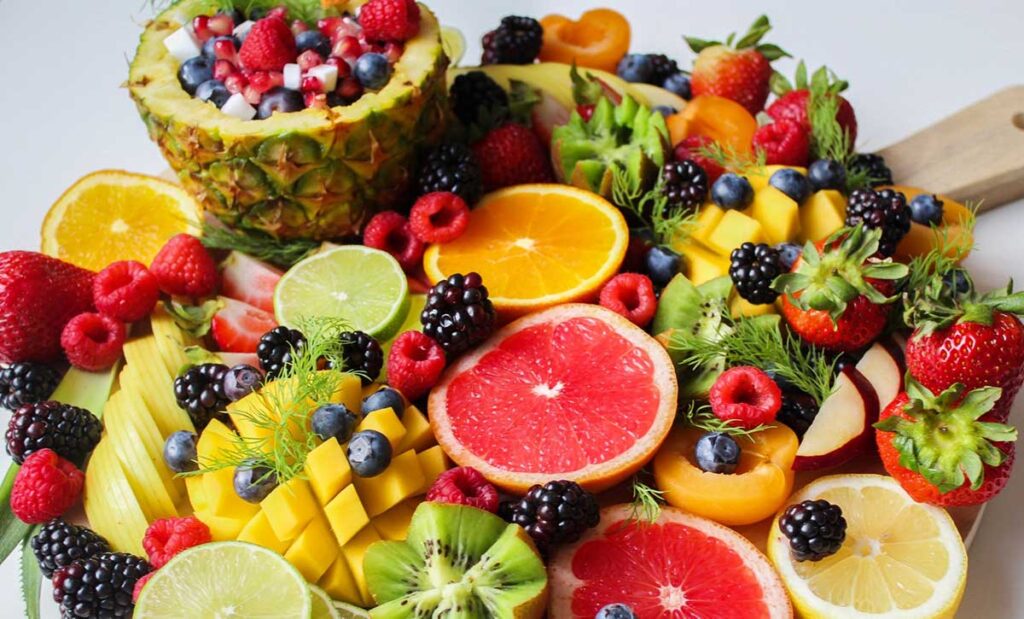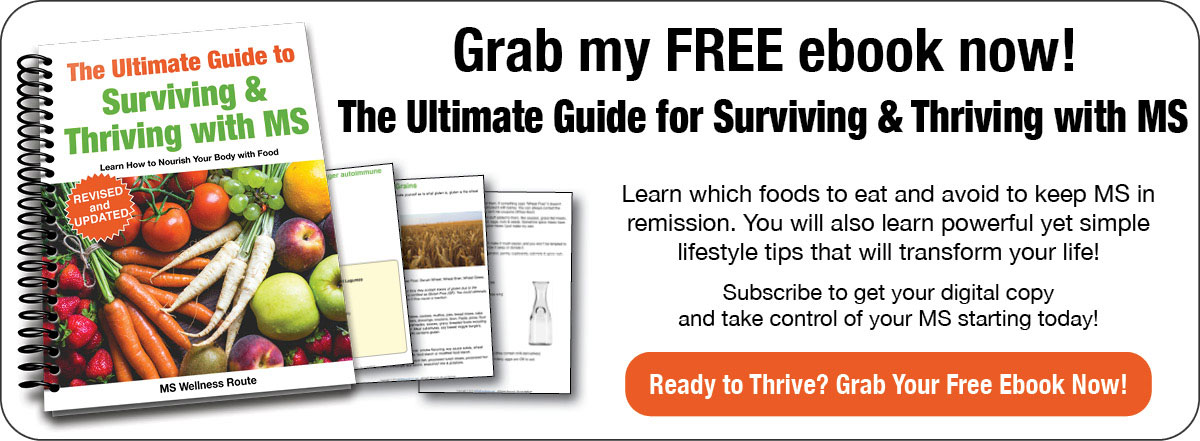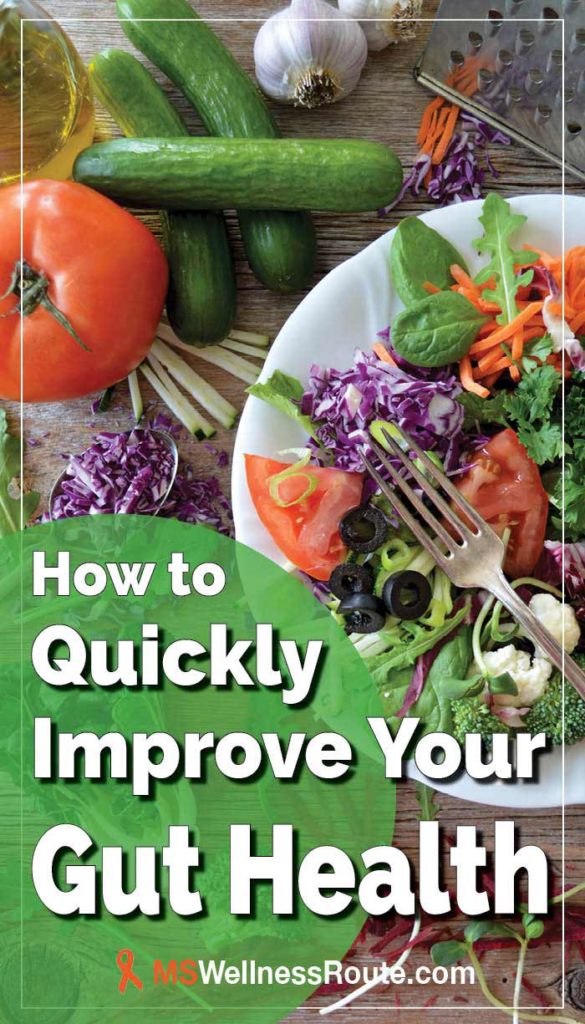Last Updated on January 30, 2025 by Cathy

Your gut plays a HUGH impact on your health and your brain. A healthy gut contributes to overall well-being, empowering yourself to improve your gut health. It also helps regulate inflammation, reducing the risk of inflammatory conditions such as multiple sclerosis (MS).
“Gut immune cells travel to the brain during multiple sclerosis (MS) flare-ups in patients. These gut cells seem to be playing a protective role, helping drive MS symptoms back into remission.” – University of California San Francisco
Good bacteria live in our gut and help digest food and protect us from diseases. When you have poor gut health you’re more prone to depression, skin issues, and weight gain. A healthy gut helps maintain your overall well-being. It helps keep out fungi, viruses, parasites, and other things.
I wish I had known about this years ago. I may not have been able to stop myself from getting MS since I was only 15 years old when I had my first symptom. But, I may have been able to prevent my son from getting type 1 diabetes. Which is also connected to poor gut health.
There’s nothing we can do about the past. But there are plenty of things you can do to start adding more “good bugs” for a healthier gut. It’s never too late to start, you just need to take the first step and start today!
Stop Killing Your Good Bacteria
First, you need to stop harming your gut and killing the good bacteria. Overuse of antibiotics is the number one reason for an unhealthy gut. Years ago doctors handed out antibiotics for everything. Unfortunately, they didn’t realize the harm it was doing to our long-term health.
Antibiotics are important when we need them. Our son would have died from a serious bacterial infection if it wasn’t for a major dose of antibiotics. It’s important to take antibiotics in situations like that.
Another reason we are missing good bacteria is due to eating a diet that is high in sugar and processed foods. It not only feeds the bad bacteria it also feeds candida (yeast overgrowth) and parasites. Yes, we can get parasites from contaminated water, food, and our beloved pets.
Candida can cause symptoms such as:
- Constipation
- Dandruff
- Diarrhea
- Digestive stress
- Fatigue
- Nail fungus
- Oral thrush
- Skin issues
- Sugar cravings
- Urinary tract infections
- Yeast infections
Improving Your Diet

Start by cutting out processed foods and eating a low-carb diet. Eating a diet of mostly vegetables reduces inflammation. It also gives you important vitamins, minerals, and fiber. Fiber not only keeps your bowels moving but also helps your digestive system. It moves out waste and feeds the friendly bacteria in your colon.
Meat and other animal-based foods also affect our gut bacteria. But they tend to trigger more bad bacteria, especially in red meat. Plus meats are harder for our digestive system to break down. I’m not saying to stop eating meat but it is a good idea to eat less meat and more plant-based foods.
While you’re trying to heal, cut out grains, dairy, and legumes to reduce inflammation. Eating a mostly plant-based diet allows your gut microbiome to stay healthy. It allows a good balance of both good and bad bacteria. Load up on fiber since it feeds the good bacteria.
Here are 15 foods that are high in fiber:
- Acorn squash
- Almonds
- Artichokes
- Avocados
- Beets
- Broccoli
- Brussels sprouts
- Butternut squash
- Carrots
- Chia seeds
- Collard greens
- Ground flaxseeds
- Parsnips
- Raspberries
- Spinach
Natural Probiotics

Fiber is key to having a healthy gut along with natural probiotic foods. Most store-bought fermented foods are highly processed which kills the good bacteria. Always make sure the brand you are buying still contains good bacteria.
Consuming a wide variety of fruits and vegetables is the basis for promoting and maintaining optimal gut health. Plant foods rich in fiber, vitamins, and antioxidants play a crucial role in feeding beneficial bacteria in the gut. Their fiber content aids in digestion, acting as a prebiotic that fuels the growth of probiotics.
Plus, the antioxidants and vitamins found in fruits and vegetables contribute to a healthy immune system, shielding the gut from harmful pathogens. The phytochemicals in these foods not only support gut health but also possess anti-inflammatory properties, helping to reduce inflammation within the digestive tract. By consuming a colorful variety of fruits and vegetables in your diet, you improve your gut health.
Feed Your Good Bugs
Prebiotic foods such as garlic, help feed the probiotics. Prebiotics are a type of dietary fiber. They feed the good bacteria, it’s like adding fertilizer to your garden. Your body can’t fully break down prebiotics. So they pass through your intestines to your colon where they ferment and feed the good bacteria.
For your convince, there is a FREE Gut Health Tracker at the bottom of this post.
10 Prebiotic foods:
- Apples
- Asparagus
- Bananas
- Cocoa
- Dandelion greens
- Garlic
- Ground flaxseeds
- Jerusalem artichokes
- Leeks
- Onions

Learn to Manage Stress
When trying to fix your gut health, you may not think of stress. But, stress plays a high role in your gut health. Have you ever felt sick to your stomach when you were nervous? There’s a reason for that, the gut and the brain communicate with each other, it’s called the gut-brain axis.
When you are stressed your body kicks out stress hormones. These hormones flood your body giving you more energy and the ability to think clearly. This is also known as the “fight or flight” response. It also shuts down your digestive system. Who wants to eat when there’s immediate danger coming at you?
When stressed the digestive system shuts off. When you are under constant stress your digestive system is always off. Years of chronic emotional stress set me back by causing my walking to get worse.
Problems with chronic stress:
- Causes hormone imbalances
- Feeds bad bacteria, candida, and parasites
- Increases depression and anxiety
- Promotes a leaky gut
- Raises blood pressure
- Raises blood sugar
- Suppresses immune function
If you are under a lot of stress you need to learn how to manage it or you won’t be able to heal your digestive system. Managing your stress is just as important as eating a healthy diet. Learn to meditate, stop watching the news, don’t hang around negative people, and see a counselor if needed.
Quick Links To Information In This Post:
Improve Your Gut Health
When you’re trying to improve your gut health, you’re healing your entire body. It’s not just a digestive problem or a neurological problem, it’s a whole-body problem. Make sure you get enough sleep, drink lots of water, help your body detox, and exercise. Taking many deep breaths throughout the day helps relieve stress and removes toxins. Go outside and enjoy the sunshine, relax, or watch a funny movie.
It’s all a balancing act but you can do it!

Gut Health Tracker!
Subscribe for free and I’ll send you the password to my secret library filled with many printables including the Gut Health Tracker.
Want to remember this? Pin it to your favorite Pinterest board!

Image by LyraSid and RitaE from Pixabay
Quickly Improve Your Gut Health






Hello.
I am an M.S patient. I have been on a very strict diet to help with M.S. The only issue i have is my moning cup of latte. I drink 1% or 2 of milk. Sometimes 1 or 2 spoons of low fat Greek yogurt to ease my constipation.No meats, no alcohool, no sugar, no gluten, Nuts especially Almonds, walnuts, peanuts, peanut butter with moderation soetimes, almond butter, ….
Please, am i doing the right thing?
Thank you.
Maria.
Hi Maria,
Dairy can have many problems like increasing inflammation. One study linked consuming dairy to higher rates of MS. It’s best to completely remove dairy then a few months later reintroduce dairy to see if you have any reactions. If you don’t then it should be okay to consume as long as it’s from grass-fed cows. If you’re following a strict paleo diet, like me, then you should remove all dairy, grains, refined sugar, and legumes like soy or peanuts.
Grass-fed beef, pasture-raised poultry, and wild-caught fish are all good to eat. The main thing you should be eating is vegetables, eat them with every meal.
Everyone is different, pay attention to your body and remove any food item that causes you any kind of bad reaction.
Cathy